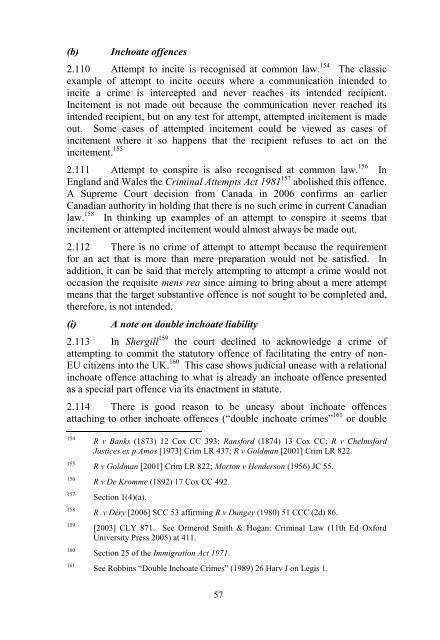Consultation Paper on Inchoate Offences - Law Reform Commission
Consultation Paper on Inchoate Offences - Law Reform Commission
Consultation Paper on Inchoate Offences - Law Reform Commission
Create successful ePaper yourself
Turn your PDF publications into a flip-book with our unique Google optimized e-Paper software.
(b)<strong>Inchoate</strong> offences2.110 Attempt to incite is recognised at comm<strong>on</strong> law. 154 The classicexample of attempt to incite occurs where a communicati<strong>on</strong> intended toincite a crime is intercepted and never reaches its intended recipient.Incitement is not made out because the communicati<strong>on</strong> never reached itsintended recipient, but <strong>on</strong> any test for attempt, attempted incitement is madeout. Some cases of attempted incitement could be viewed as cases ofincitement where it so happens that the recipient refuses to act <strong>on</strong> theincitement. 1552.111 Attempt to c<strong>on</strong>spire is also recognised at comm<strong>on</strong> law. 156 InEngland and Wales the Criminal Attempts Act 1981 157 abolished this offence.A Supreme Court decisi<strong>on</strong> from Canada in 2006 c<strong>on</strong>firms an earlierCanadian authority in holding that there is no such crime in current Canadianlaw. 158 In thinking up examples of an attempt to c<strong>on</strong>spire it seems thatincitement or attempted incitement would almost always be made out.2.112 There is no crime of attempt to attempt because the requirementfor an act that is more than mere preparati<strong>on</strong> would not be satisfied. Inadditi<strong>on</strong>, it can be said that merely attempting to attempt a crime would notoccasi<strong>on</strong> the requisite mens rea since aiming to bring about a mere attemptmeans that the target substantive offence is not sought to be completed and,therefore, is not intended.(i)A note <strong>on</strong> double inchoate liability2.113 In Shergill 159 the court declined to acknowledge a crime ofattempting to commit the statutory offence of facilitating the entry of n<strong>on</strong>-EU citizens into the UK. 160 This case shows judicial unease with a relati<strong>on</strong>alinchoate offence attaching to what is already an inchoate offence presentedas a special part offence via its enactment in statute.2.114 There is good reas<strong>on</strong> to be uneasy about inchoate offencesattaching to other inchoate offences (“double inchoate crimes” 161 or double154155156157158159160161R v Banks (1873) 12 Cox CC 393; Ransford (1874) 13 Cox CC; R v ChelmsfordJustices ex p Amos [1973] Crim LR 437; R v Goldman [2001] Crim LR 822.R v Goldman [2001] Crim LR 822; Mort<strong>on</strong> v Henders<strong>on</strong> (1956) JC 55.R v De Kromme (1892) 17 Cox CC 492.Secti<strong>on</strong> 1(4)(a).R v Déry [2006] SCC 53 affirming R v Dungey (1980) 51 CCC (2d) 86.[2003] CLY 871. See Ormerod Smith & Hogan: Criminal <strong>Law</strong> (11th Ed OxfordUniversity Press 2005) at 411.Secti<strong>on</strong> 25 of the Immigrati<strong>on</strong> Act 1971.See Robbins “Double <strong>Inchoate</strong> Crimes” (1989) 26 Harv J <strong>on</strong> Legis 1.57
















